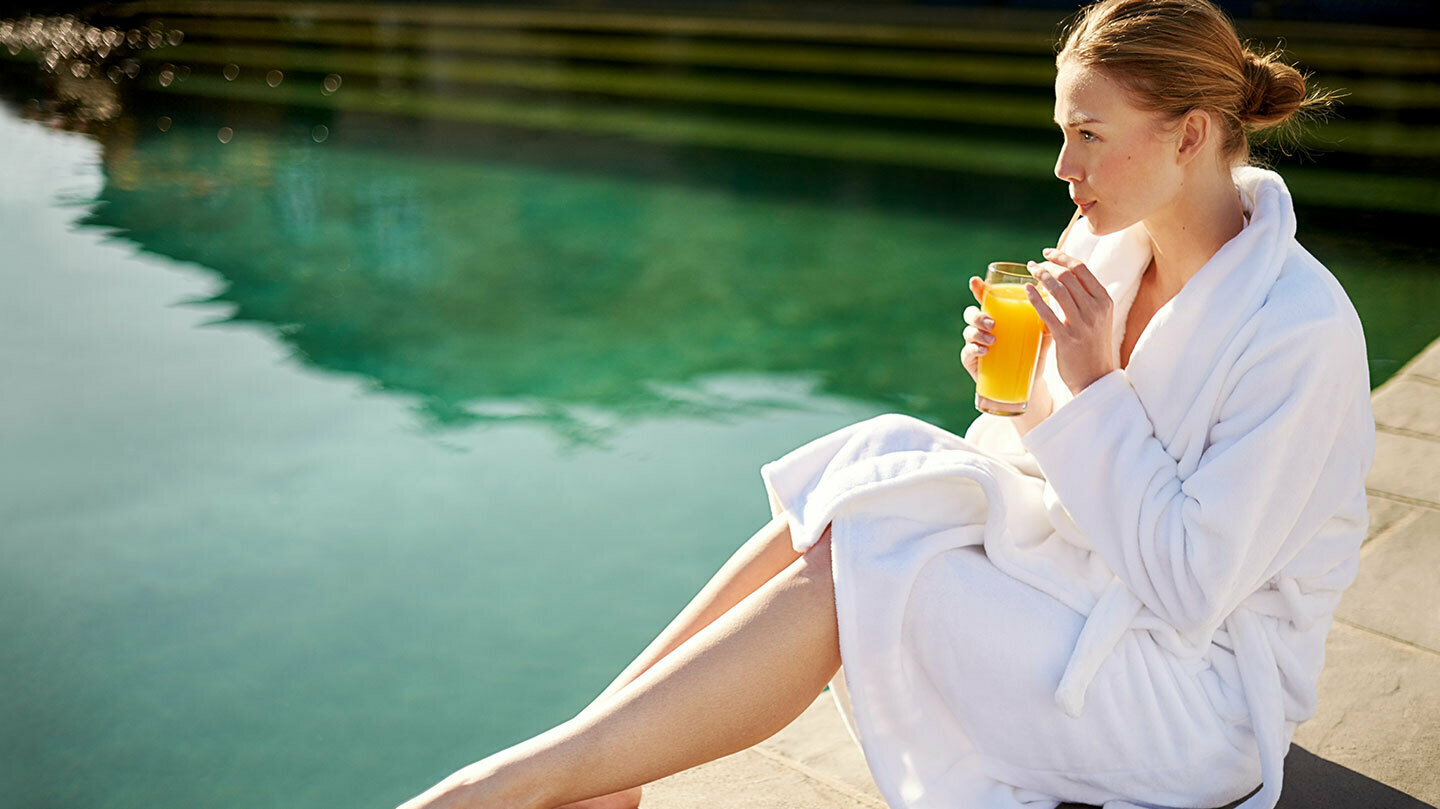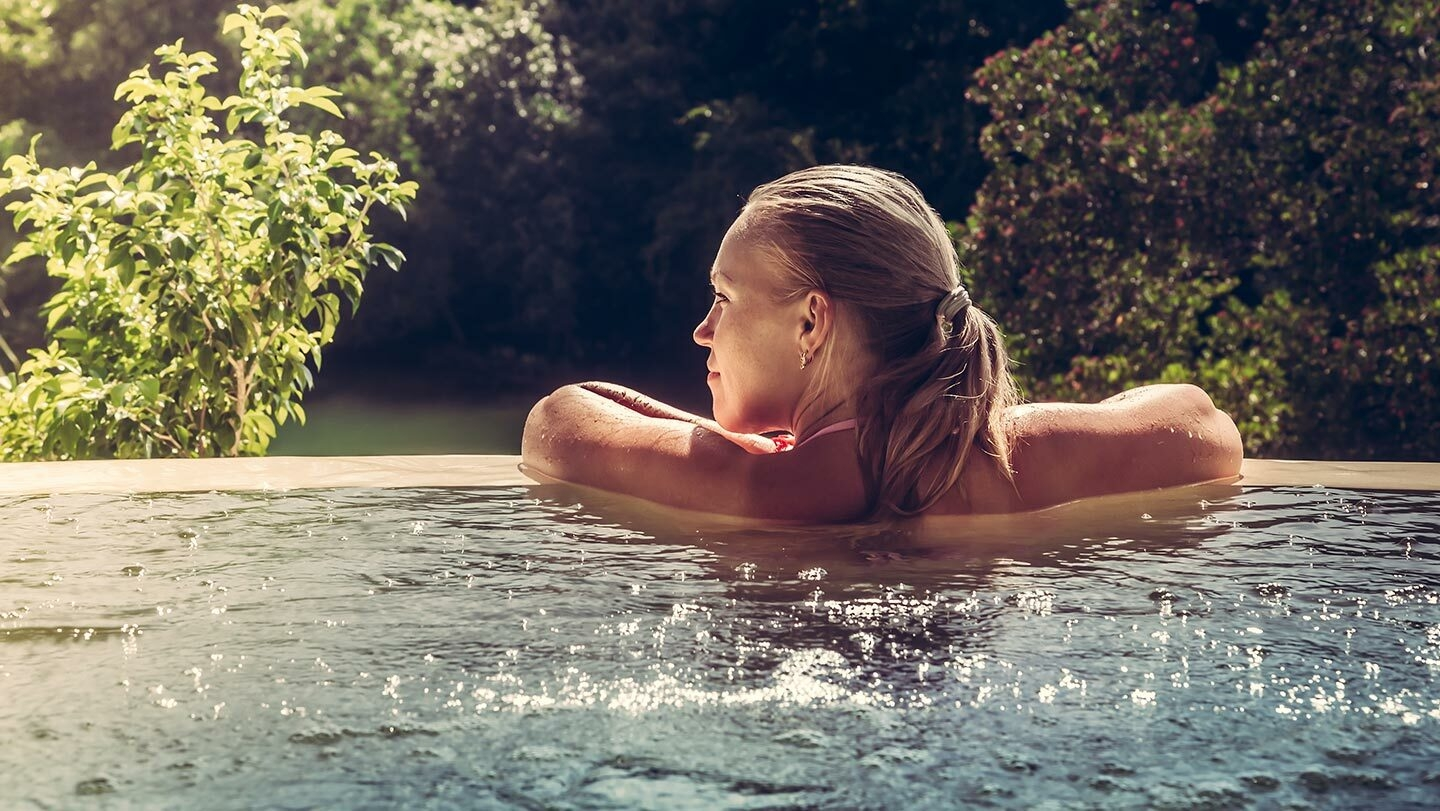We're probably all familiar with at least one of the common side-effects of swimming: sore eyes, skin irritations, fading swimming costumes, and that lovely smell that lingers until you've had a good shower. But chlorine itself, when used at the recommended low levels, is perfectly safe.
When chlorine is added to swimming pool water, it breaks down into two chemicals: one kills bacteria almost instantly, the second stays in the water killing any bacteria brought in by new bathers. In spas, it is not possible to drain and refill a pool or a hot tub every time a new bather arrives, so pool water not only has to be sanitised before it gets into a pool, but the water must stay clean throughout the day. With new bathers frequently entering pools, bringing bacteria with them, this residual cleansing of the water is essential.

There are very few dangers to your health when chlorine is used correctly. The main hazard of chlorine use is the person responsible for getting it into the pool in the right amounts on a regular basis. With the correct amount of chlorine, a pool's pH (a measure of how acidic the water is) will be at the recommended level of 7.4: the pH of your own tears. If the chlorine level in the pool is too high, this can cause strong chemical smells, sore throats, irritate skin and cause red eyes. By far the biggest risk is where chlorine levels are not monitored correctly.
Some studies have suggested that children may be more likely to develop asthma if they swim regularly in chlorinated pools. When chlorine levels are too high, sweat, skin, and other organic compounds can react with chlorine, producing harmful fumes that cause irritation to the eyes, skin, and respiratory system. However, these findings may show the effects of over-chlorination, but do not suggest that a low level of chlorine is harmful. It has been proven that children with asthma benefit from exercising in the warm, humid air of a pool, as it is less likely to trigger symptoms, and swimming has significant health benefits. For adults there is much less to worry about, as a developed body is far less likely to be affected.
Cosmetics, suncreams and body lotions can also cause problems as they contain compounds that can react with chlorine, creating an irritant. Shower before and after entering any pool or hot tub, and remove all make-up, body lotion, suncream, and hair products before entering the water.
If you have bleached or highlighted hair that turns green in pools, this is likely to be caused by copper in the water, suggesting that the pH is too high (eroding copper fittings), or the water contains copper-based algicides, not that chlorine is responsible.
You may have seen information suggesting the harmful effects of chemicals such as chlorine on our environment. However, it is industrial uses causing the problems; the chlorine levels used in bathing (and drinking) water are too low to have such an impact. Pools are rarely emptied directly into nearby streams but are channelled to treatment plants or regulated outlets. Although chlorine can have negative environmental effects, you are likely to introduce more chlorine to the environment by watering your garden, than an occasional trip to a spa.

The two most popular chlorine alternative water treatments for use in pools are ultraviolet filtration and ozone generators:
UV filtration: Water is irradiated by ultraviolet light, which kills existing bacteria. This UV system can sanitise water as it enters a pool, but has no residual cleansing properties, so cannot kill bacteria brought into the water by new bathers.
Ozone: Ozone is an effective oxidiser, so can be used in water sanitisation. Like UV light filtration, ozone can only assist in sanitising water on entry, and does not offer residual cleansing. Neither ozone nor UV treatments are stand-alone solutions. They must be used in conjunction with a sanitiser that stays in the water. So although these methods claim to offer an alternative to chlorine, they must work in conjunction with a low level of chlorine in the water in order to meet safety standards. However, as the levels of chlorine used with these systems are very low, these solutions do avoid the risk of over-chlorination and its effects.
The bacteria in an unchlorinated pool are more likely to do your health damage than chlorine itself. The health benefits of swimming and bathing far outweigh any proven adverse effects. Over-chlorinating may make your eyes itch, but if you consider that chlorine eradicates micro-organisms that carry water-borne diseases such as dysentery, hepatitis A, and cholera, it is easy to see its benefits.
Just be aware of the warning signs of over-chlorination:
References
World Health Organization: Guidelines for safe recreational-water environments. Vol 2. Swimming pools, spas and similar recreational-water-environment. Geneva: World Health Organization, 2000.
See www.who.int Bernard et al. Lung hyperpermeability and asthma prevalence in schoolchildren: unexpected associations with the attendance at indoor chlorinated swimming pools, in Occupational and Environmental Medicine 2003; 60:385-394, BMJ Publishing Group, 2003.

Summer Spy
20th May 2013
Spy Likes:
Warmth and sunshine; spas which take me away to another country; fruit infused waters; beach-worth pedicures; deep tissue massages.
Spy Dislikes:
High footfalls; treatments that over promise and under deliver; heavy lunches; loungers drapped in used towels.
